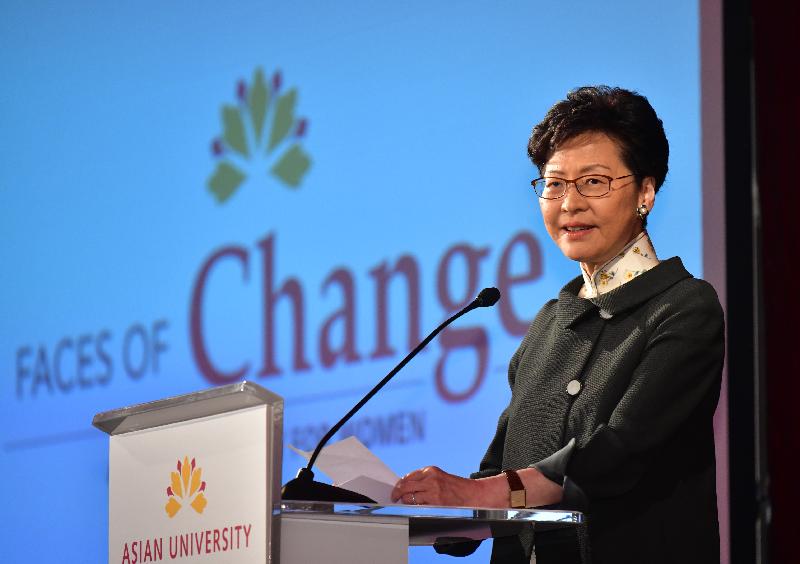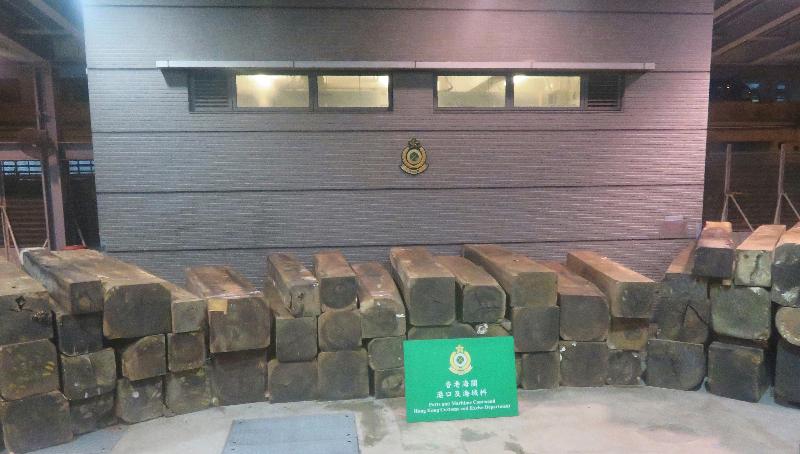Following is the speech by the Chief Executive, Mrs Carrie Lam, at the Asian University for Women Gala Dinner this evening (June 11):
Mr Ahmad (the Founder of the Asian University for Women, Mr Kamal Ahmad), ladies and gentlemen,
Good evening. It really gives me great pleasure to join you tonight for Hong Kong's third Asian University for Women (AUW) Gala Dinner.
Like countries and economies, institutions and individuals all over the world, Hong Kong has embraced the AUW, its vision, its inspiration and, in just over a decade, its resounding impact throughout the region. Like me, you are here this evening because you believe in the mandate of the AUW, and because you are heartened by the promise of its students, women largely from Asia's rural and economically marginalised regions. We are all exhilarated by their potential to become leaders in their countries and communities, and to have a voice that is heard and respected.
Education plays a big part in unleashing women's potential. I grew up in a grassroots family, and my parents were uneducated. However, they attached great importance to my education and put me in the best school they could find in those days. Their decision has no doubt changed my life. I went on to study in the University of Hong Kong, and after graduation, I began my long public service career, starting out as a young Administrative Officer 39 years ago. In less than three weeks, I'll mark my second year as Chief Executive of the Hong Kong Special Administrative Region – the first woman to hold this office. I'm sure I won't be the last.
I am definitely not the only woman who has benefited from Hong Kong's education. It's worth noting that, since the first female student was admitted to the University of Hong Kong in 1921, Hong Kong has achieved gender equality in education. Our female students are flourishing and excelling academically. Indeed, women today represent 54 per cent of the students enrolled in undergraduate programmes funded by our University Grants Committee. And more and more women in our universities are focusing on disciplines that were traditionally dominated by men. Just two decades ago, about 37 per cent of Hong Kong medical students were female. Today more than half of our medical students are women. Consider, too, engineering and technology majors. From about 14 per cent two decades ago, female students focused on those disciplines now count 30 per cent of the total.
Gender equality in education has enabled our women to enjoy equal employment opportunities. In Hong Kong, women are protected by the same labour legislation as men are. Women now comprise nearly half of our solicitors and public accountants, compared to about one-third two decades ago. Over the same period, managerial positions in Hong Kong have gone from about 20 per cent filled by women to 35 per cent. Those percentages are very much similar to those in our Government. Today, more than one-third of Hong Kong civil servants at the directorate level, that is the most senior level, are women. Two decades ago, that percentage was just over 15 per cent.
Still, working women do face a lot of challenges in striking a balance between their important role in their family and the development of their career. The participation rate of our female labour force last year was just under 51 per cent; for men it was 68.5 per cent. Clearly, we have some ways to go yet in creating a society that is as balanced in terms of careers as it is in educational opportunities.
As Chief Executive, I can assure you that creating a level playing field for women in business is a high priority for my Government. That's why I proposed in my Policy Address last October a number of pro-women measures. These measures include expanding maternity leave from 10 weeks to 14 weeks, with the extra four weeks in maternity leave pay to be borne in full by the Government. We plan to introduce the amended legislation in the Legislative Council before the end of this year.
We are also working on a variety of measures to enhance child-care services so as to enable women with young children to take up or stay in employment. We will provide more facilities for breastfeeding, and legislative amendments to prohibit discrimination against breastfeeding have been introduced to the Legislative Council. We will introduce in the coming school year free cervical cancer vaccination for school girls of particular age groups. We will also continue our efforts to raise the proportion of female members in statutory bodies and advisory committees, so that women's voices will be heard in policy making. By the way, our Hong Kong Exchanges and Clearing Limited, which runs the very important stock market in Hong Kong, is now having its first-ever Chairlady, Mrs Laura Cha. We will together call on all listed companies to appoint more females as their board members.
In short, we will create every opportunity we can for the women of Hong Kong. Equal opportunity, whether in work, education or any other sphere of society, is essential to creating a caring and inclusive community. And in enabling the ambitions of women – whether in Hong Kong, in Bangladesh or any other country or economy – we can ensure a thriving future for us all.
The AUW is helping to realise that future. Since opening in 2008, AUW has graduated more than 800 students, including 100 who proudly received their degrees one month ago. Some 20 per cent of them will go on to graduate school at prestigious institutions all over the world. And when classes begin again in August, AUW will be home to some 950 women from 17 countries. And 90 per cent of those students will be there at the AUW campus in Chittagong, Bangladesh, on a full scholarship – thanks to you. Thanks to your understanding, your generosity, your unshakable determination to be a force for social change. That's a formidable force for good.
Thank you very much for giving me this opportunity to support AUW for its wonderful mission.
Thank you.



